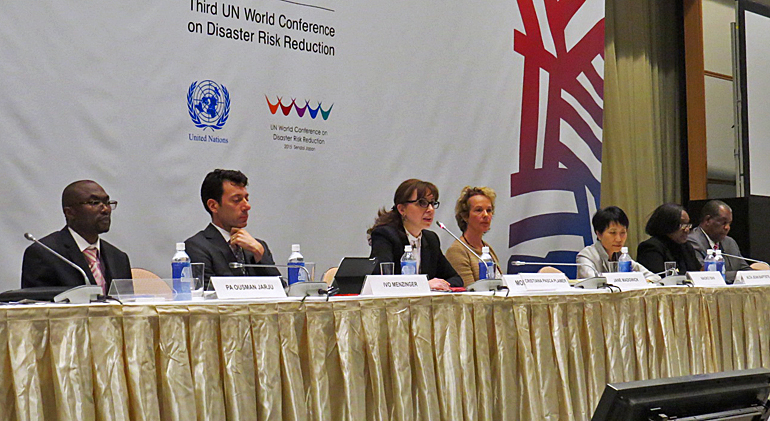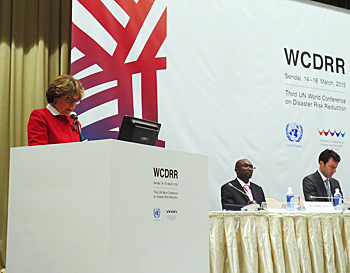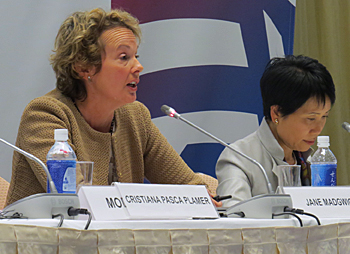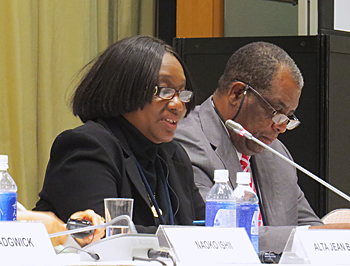WCDRR 2015: Scaling up coastal ecosystems contributes to disaster risk reduction

“By emphasising the productivity of an ecosystem we can overcome the idea that nature conservation blocks any economic activities”, advised director Jane Madgwick of Wetlands International. She was one of the panellists in the working session on mainstreaming ecosystem-based disaster risk reduction.
Huge potential for disaster risk reduction
The working session was part of the UN World conference on disaster risk reduction in Sendai, Japan on 14 March.
Mainstreaming the development of coastal ecosystems can make a huge contribution to global disaster risk reduction, according to the organisers of the event.
 Dutch pricess Margriet opened the working session mentioning the importance of reforestation to counter erosion.
Dutch pricess Margriet opened the working session mentioning the importance of reforestation to counter erosion.
Reforestation in coastal areas
The working session was opened by Dutch princess Margriet who has long been actively involved in the work of the Red Cross. She told the audience that reforestation is a key activity of the Red Cross.
One of the specific areas of reforestation are the coastal mangrove forests. Due to the disappearance of many of these forests the coastal area have become much more vulnerable to floods.
The princess reminded the audience that this year many important global conferences will take place that involve ecosystems. Sendai being the first. “It will be a crucial year, so gear up for work”, she kicked off the session.
 Jane Madgewick talked about thge importance of 'champions' that can bring in enthousiasme into a partnership and can make a project succesfull.
Jane Madgewick talked about thge importance of 'champions' that can bring in enthousiasme into a partnership and can make a project succesfull.
Enough pilots
Central theme of the session was to seek ways to mainstream the combination of nature restoration and disaster risk reduction, the so-called eco-based DRR.
Wetlands International wants to scale up coastal ecosystems, such as oyster reefs, salt marshes and mangrove forests, to create a win-win for nature and flood protection.
Many pilots have proven the concept to work and the organisation believes it’s time for scaling up.
Jane Madgwick mentioned the recent started wetlands restoration project on the Northern coast of Java, Indonesia. The project involves 9 km coastline.
Seeking champions
According to Madgwick, the project is a good example of how ministries can work together. Too often these kind of integrated project get trapped between different ministries.
“In this case the fishery department was the first that got interested”, she said. “There was hardly any fishery left in this coastal zone and a new wetland would bring back the fish. They got enthusiastic and this resulted in the department of infrastructure wanting to be part of the success. In the fishery department we had our champion”.
Madgewick strongly advocated to work with champions.
 Alta Jean Baptiste of the Civil protection of Haiti told about creating coastal ecosystems with a economic productivity, like planting fruit trees.
Alta Jean Baptiste of the Civil protection of Haiti told about creating coastal ecosystems with a economic productivity, like planting fruit trees.
Unusual suspects
Another panellist was Alta Jean Baptiste, head directorate of civil protection of Haiti. She told how his/her country is restoring coastal zones. “We aim at healthy ecosystems that include productive fruit trees. Although we are a civil protection agency we want to bring in economy”.
Baptise suggested to regard the tourist sector as a potential champion.
Jane Madgwick mentioned the example of the Dutch Ecoshape programme in which big dredging companies participate. “They believe in working with nature as it creates a market advantage.”
Also read on this website
• WCDRR 2015: Highlights of Dutch contributions on flood risk reduction, 23 March 2015
• WCDRR 2015: Japan and Netherlands join UNISDR in Resilient Cities Initiative, 23 March 2015
• WCDRR 2015: Agreement on seven targets to reduce victims and damage caused by disasters, 22 March 2015
• WCDRR 2015: First international performance for special Dutch water envoy, 20 March 2015
• WCDRR 2015: Dutch flood expertise appreciated in Serbia, 19 March 2015
• WCDRR 2015: Colombia, Japan and the Netherlands take lead in global advocacy of river deltas, 17 March 2015
• WCDRR 2015: Royal Dutch field visit to tsunami hit elementary school, 17 March 2015
• WCDRR 2015: Disaster risk reduction makes a perfect blend with water management, 16 March 2015
• WCDRR 2015: Partners for resilience puts communities in front seat of smart DRR, 15 March 2015
• WCDRR 2015: Flood prevention key for Dutch delegation in Sendai, Japan, 10 March 2015
• Indonesia and Netherlands launch initiative for coastal safety Java, 3 March 2015
More information
Wetlands International
Wageningen, the Netherlands
+31 318 660910
www.wetlands.org



